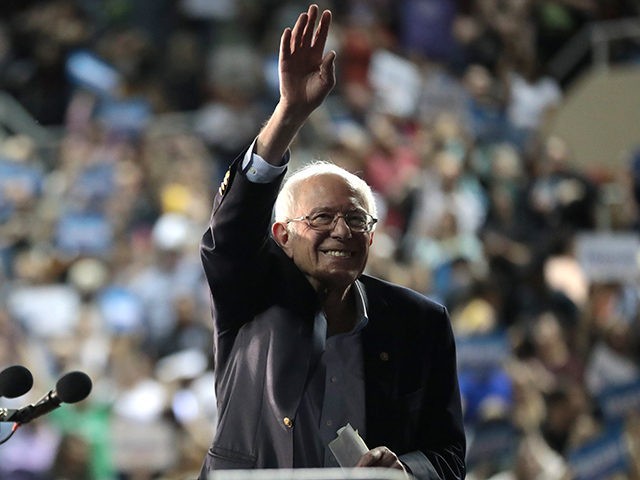Sen. Bernie Sanders (I-VT) on Monday pledged that he will provide all Americans with a free vaccine for coronavirus if he is elected president.
Addressing supporters in St. Louis on the eve of the Missouri primary contest, Sanders assailed Health and Human Services Secretary Alex Azar for saying the Trump administration cannot control the price of the vaccine “because we need the private sector to invest.”
“We are uniquely prepared to take on a pharmaceutical industry which in some cases charges us ten times more for the same exact drug that’s sold abroad,” Sanders began.
“Let me tell you, if elected president, everybody in this country will get that [coronavirus] vaccine absolutely free,” he then said.
“Is that a radical statement? I mean that is the most obvious statement that anybody can make,” he added.
Later in his remarks, Sanders noted New York state’s efforts of using prison labor to produce hand sanitizer in an effort to offset alleged price gouging by Amazon, eBay, and others as the coronavirus continues to spread in the United States.
“I just learned a few moments ago that in New York State the government is doing the right thing. They are manufacturing disinfectant, for hand washing, to make sure that everybody will be able to get the Purell or whatever they need,” Sanders said.
“What they’re saying is, they are telling the manufacturers today to stop the price-gouging. And they’re manufacturing it. And we are prepared to say that to the pharmaceutical industry: stop ripping off the American people,” he added.
Dozens of research groups around the world are racing to create a vaccine as COVID-19 cases continue to grow. Importantly, they’re pursuing different types of vaccines — shots developed from new technologies that not only are faster to make than traditional inoculations but might prove more potent. Some researchers even aim for temporary vaccines, such as shots that might guard people’s health a month or two at a time while longer-lasting protection is developed.
“Until we test them in humans we have absolutely no idea what the immune response will be,” cautioned vaccine expert Dr. Judith O’Donnell, infectious disease chief at Penn Presbyterian Medical Center. “Having a lot of different vaccines — with a lot of different theories behind the science of generating immunity — all on a parallel track really ultimately gives us the best chance of getting something successful.”
First-step testing in small numbers of young, healthy volunteers is set to start soon. There is no chance participants could get infected from the shots, because they do not contain the virus itself. The goal is purely to check that the vaccines show no worrisome side effects, setting the stage for larger tests of whether they protect.
First in line is the Kaiser Permanente Washington Health Research Institute in Seattle. It is preparing to test 45 volunteers with different doses of shots co-developed by NIH and Moderna Inc.
Next, Inovio Pharmaceuticals aims to begin safety tests of its vaccine candidate next month in a few dozen volunteers at the University of Pennsylvania and a testing center in Kansas City, Missouri, followed by a similar study in China and South Korea.
The Associated Press contributed to this report.

COMMENTS
Please let us know if you're having issues with commenting.